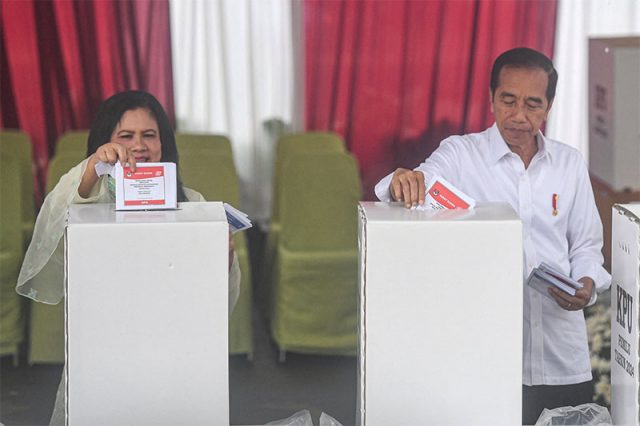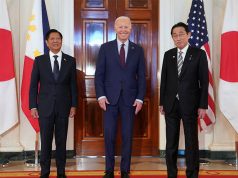
- Jokowi effect central to Prabowo’s support
- Polls show commanding lead for Prabowo in 3-way race
- Undecided voters crucial for Anies, Ganjar
- President under fire, accused of meddling
JAKARTA — Indonesia holds an election of mammoth proportions on Wednesday headlined by the race to succeed the wildly popular President Joko Widodo, a leader whose outsized influence could determine who takes the helm of the world’s third-largest democracy.
Nearly 259,000 candidates are contesting 20,600 posts across the archipelago of 17,000 islands in the world’s biggest single-day election, but all eyes are on the presidency and the fate of Widodo’s ambitious agenda after a decade in charge of one of Asia’s biggest and fastest-growing major economies.
The race pits two charismatic former governors, Ganjar Pranowo and Anies Baswedan, against controversial frontrunner Prabowo Subianto, a former special forces commander feared in the 1990s as a top lieutenant of Indonesia‘s late strongman ruler Suharto.
Defense Minister Prabowo is contesting his third election after twice losing to Widodo, better known as Jokowi, who is tacitly backing and betting on his former rival as a continuity candidate to preserve his legacy, including a role for his son as Prabowo’s running mate.
Jokowi, who cannot run again, has not explicitly backed a candidate but his implied endorsement is rubbing off on Prabowo, who during the campaign has led all of Indonesia‘s most watched opinion polls, with two surveys last week projecting he will win the majority of votes and avoid a second round.
Those surveys show Prabowo with 51.8% and 51.9% support, with Anies and Ganjar a whopping 27 and 31 points adrift respectively. To win outright, a candidate needs over 50% of votes and to secure 20% of the ballot in half of the country’s provinces.
“Jokowi as the decisive factor has been proven by the rising popularity of Prabowo,” said Arya Fernandes of Indonesia‘s Center for Strategic and International Studies.
“But whether or not Prabowo can win in one round, there are some other factors outside of Jokowi,” he said, noting turnout would be crucial for Prabowo.
“Jokowi’s effect has reached the maximum level.”
Continuity vs change
The outcome will be closely watched by investors to see who will take stewardship of a resource-rich, Group of 20 economy of over $1.3 trillion, which under Jokowi has positioned itself as a future destination for multinational firms in the global electric vehicle supply chain.
Undecided voters will be critical to former Jakarta governor Anies and the populist ex-Central Java governor Ganjar, to try to force a runoff in June between the top two finishers, a scenario that could shift the dynamic of the presidential race.
Anies has campaigned on promises of change and preventing a backsliding in the democratic reforms achieved in the 25 years since the end of Suharto’s authoritarian, kleptocratic rule.
Ganjar hails from Jokowi’s ruling party and has campaigned largely on continuing the president‘s policies, but crucially is lacking his endorsement, leaving him with a mountain to climb against Prabowo, who is pursuing a similar agenda.
The 72-year-old Prabowo has cultivated a huge youth following on social media, owing to a rebrand that has transformed his image from a fiery-tempered nationalist and military hard man to a cuddly grandfather figure with awkward dance moves.
Prabowo’s more gentle characterization, played out largely on short video app TikTok, has endeared him to voters under 40, who make up more than half of the 204.8 million electorate.
But Jokowi’s intimated support for Prabowo, plus allegations he interfered in a court ruling to allow his son to contest the vice presidency, have prompted an unprecedented storm of criticism that he has overreached, departing from previous presidents who have been neutral over their succession.
His loyalists have rejected that and it is unclear if the allegations will impact Prabowo.
Jokowi’s gambit could still pay off, with some analysts seeing it as a calibrated maneuver to retain influence long after he leaves office.
Wasisto Raharjo Jati, a politics analyst at the National Agency for Research and Innovation, said the election would be much about what the candidates are promising.
“How big an impact Jokowi’s interference will have still remains to be seen,” he said.
“The candidates’ programs will be the decisive factor… Populist pledges that are easy to remember will be very influential.”
— Reporting by Ananda Teresia and Stanley Widianto; Writing by Martin Petty; Editing by Nick Macfie









